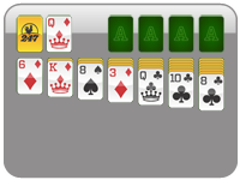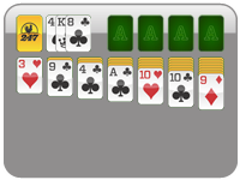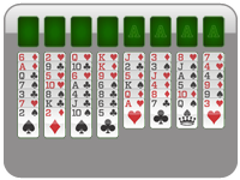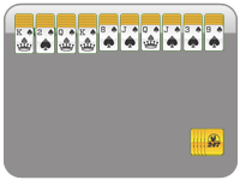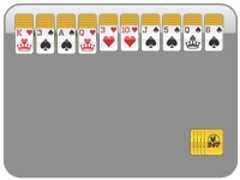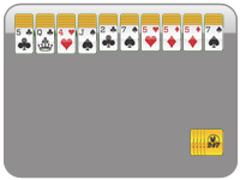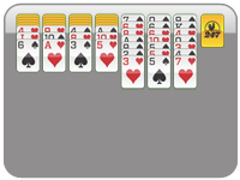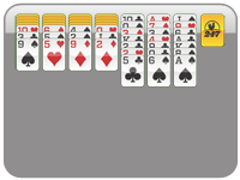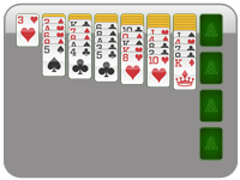Activities for Nursing Home Residents: Card Games!
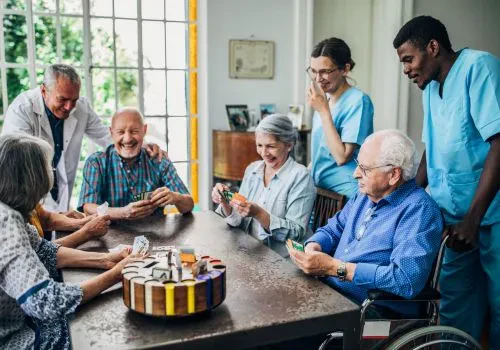
Transitioning to a nursing home can be very difficult for individuals, but engaging in activities is one of the main ways to help with this change. If you’re looking for activities for nursing home residents, you’ve come to the right place.
Card games are a fun, social, and mentally stimulating option for nursing home residents. In this article, we’ll discuss the health benefits of card games, the best games for different skill levels, and tips for making them even more enjoyable.
Why Card Games Are Great Activities for Nursing Home Residents
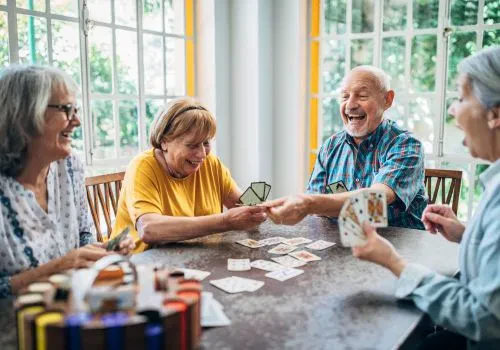
In this section, we’ll discuss how card games can offer cognitive benefits, social outlets, and emotional benefits for nursing home residents.
1. Cognitive Benefits: Keeping the Mind Sharp
Card games are especially beneficial for cognitive health. Cognitive health refers to how well a person thinks, learns, and remembers. When nursing home residents play card games, they support and maintain their own memory, focus, and problem-solving skills. Card games require strategic thinking, memory retention, and decision-making, all actions that stimulate the brain.
Studies show that mentally stimulating activities like playing card games, reading, writing, and social interaction can reduce the risk of developing dementia and Alzheimer’s disease. Therefore, mental stimulation may help nursing home residents preserve their cognitive health for longer.
2. Social Connection: Reducing Isolation
Building social connections is crucial for nursing home residents, and it can be difficult to find opportunities that provide a sense of belonging and purpose. Multiplayer card games serve as a great outlet for social interaction. These games can encourage competitive play, foster conversation among nursing home residents, and can reward teamwork with others in games like Rummy or Bridge.
These games facilitate new opportunities for nursing home residents to spend quality time with friends, family, and other residents. They can enhance communication skills and create positive emotional bonds.
These card games also lead to new opportunities to spend quality time with friends, family, or other residents. They not only enhance communication skills and create positive emotional bonds, but they can help nursing home residents combat loneliness. Studies show that social relationships and social activities improve the health, well-being, and happiness of older adults.
3. Emotional Well-Being: A Fun and Rewarding Experience
Card games can also improve the emotional well-being of nursing home residents. When an individual masters a game’s rules and the necessary strategies to win, they can feel a sense of accomplishment. Card games can also act as a stress reliever and improve someone’s mood.
A simple yet rewarding game like Solitaire allows a person to solve an infinite number of puzzles by randomly dealing a deck of cards. With themed decks (holiday-themed decks, customized cards), the game can be enhanced with a festive spirit.
Best Card Games for Nursing Home Residents
In the next section, we’ll look at 8 great card games for nursing home residents.
1. Solitaire (Best for Solo Play & Relaxation)
One of the most common and popular card games, Solitaire is a great, independent single-player game that can help a resident’s focus, patience, and problem-solving skills. And with free online platforms like 247 Solitaire, you can easily access different versions of Solitaire with an intuitive interface and seasonal game variations.
2. Go Fish (Best for Social Interaction & Memory Boosting)
This card-matching game is a simple, easy-to-learn game that facilitates conversation and asks the players to ask each other questions about what’s in their hands.
Go Fish is an excellent game for assisting with memory recall and pattern recognition. It can be easily adapted for residents with cognitive impairments by using color-coded or large-print cards.
3. Rummy (Best for Strategy & Friendly Competition)
A popular game among seniors who enjoy light strategy games, this card game involves matching cards and forming sets and sequences of cards.
Rummy encourages focus and mental agility without being overly complicated. Rummy also can be played in either pairs or larger groups, making it a great social activity.
4. War (Best for Quick, Easy Fun)
War is an appropriate option for a quick, luck-based game suitable for all skill levels. No complex strategies are needed to play it, and it’s perfect for residents with dementia or those who want non-competitive games.
To make it more accessible to the players, you can also obtain large-print cards for better visibility.
5. Crazy Eights (Best for Group Play & Adaptability)
This easy group card game (reminiscent of UNO) asks players to match up cards with suits or numbers. The name factors in, as putting an eight down is how you pick the next suit.
Because of the simple rules, Crazy Eights can be adjusted for different skill levels while still being helpful as a game that values quick thinking and number recognition.
6. Memory Matching Games (Best for Dementia Residents & Cognitive Stimulation)
These card-matching games help residents strengthen their memory and recognition skills by flipping over cards and remembering locations for their match.
Memory matching games also work well in both solo and group settings and can be easily customized with personal photos or themed images. Because of this, they’re ideal games for residents with dementia or who are looking for cognitive stimulation.
7. Pinochle (Best for Residents Who Enjoy Classic Strategy Games)
For residents who enjoy classic strategy games, Pinochle is a challenging card game that combines skill and chance elements.
Pinochle encourages teamwork and logical thinking and can work best for small groups who enjoy longer, multi-round games.
8. Bridge (Best for Advanced Players & Long-Term Engagement)
Bridge offers complex, strategic gameplay for advanced players and those who want long-term engagement.
Challenging players to anticipate moves and work as a team encourages long-term skill development and mental stimulation. Bridge is best played in a dedicated card club setting with regular partners.
Online activities for nursing home residents – 24/7 Solitaire

Card games are a wonderful addition to any nursing home. They can assist with memory capabilities, reduce isolation, and increase residents' happiness. By incorporating these card games, caregivers, activity coordinators, and family members will have more options for nursing home residents.
If you want an intuitive, easy-to-use alternative to in-person card games, try 247 Solitaire. This robust, free online platform offers dozens of Solitaire variations and accessibility options that will appeal to residents.
Solitaire Games
More Solitaire Games
More Games
Solitaire News
Disclaimer
DISCLAIMER: The games on this website are using PLAY (fake) money. No payouts will be awarded, there are no "winnings", as all games represented by 247 Games LLC are free to play. Play strictly for fun.

